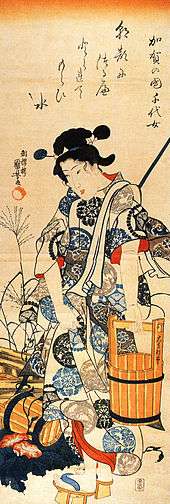Fukuda Chiyo-ni

Fukuda Chiyo-ni (Kaga no Chiyo) (福田 千代尼; 1703 - 2 October 1775) was a Japanese poet of the Edo period, widely regarded as one of the greatest female haiku poets.
Biography
Born in Matto, Kaga Province (now Hakusan, Ishikawa Prefecture), the daughter of a picture framer, Chiyo-ni began writing haiku poetry at age 7. By the age of 17, she had become very popular all over Japan for her poetry. Her poems, although mostly dealing with nature, work for a unity of nature with humanity. Her own life was that of the haikai poets who made their lives and the world they lived in one with themselves.
Chiyo-ni's teachers were the students of Bashō, and she stayed true to his style, although she did develop on her own as an independent figure. Today, the morning glory is a favorite flower for the people of her home town, because she left a number of poems on that flower. After becoming a nun, Chiyo took the Buddhist name, Soen.[1]
She is perhaps best known for this haiku:
morning glory!
the well bucket-entangled,
I ask for water
(trans. Donegan and Ishibashi)[2]
Shokouji temple in Hakusan contains a display of her personal effects.
In popular culture
The American rock band Red House Painters adapted one of Chiyo's haiku for the chorus of their song "Dragonflies".
See also
References
|